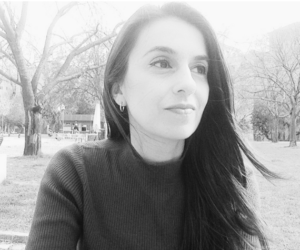Helena Costa Carvalho is a postdoctoral researcher at the Institute for Comparative Literature Margarida Losa. She has received a Ph.D. in Portuguese and Romance Studies from the University of Lisbon (2022), with the thesis The Lucidity of the Poem. Metapoetic Meditation as a Philosophical and Sapiential Path in António Ramos Rosa, having benefited from a doctoral scholarship awarded by FCT. She holds a master’s degree in Philosophy from the University of Lisbon (2013), with a dissertation on the relationship between philosophy and literature based on M. Blanchot and P. Ricoeur, and a bachelor’s degree in Philosophy from the University of Coimbra (2005).
She is a member of the team of the FCT exploratory project To See the Tree and the Forest. Reading the Poetry of António Ramos Rosa from a Distance, which takes place at ILCML. She is also part of the organizing committee of the colloquium “Between the roots and the stars: António Ramos Rosa in dialogue” (FLUP, 17-18 Oct. 2024). She also co-organizes the cycles “Passages: Literature and Philosophy” (2023-24), a set of conferences resulting from a partnership between CLEPUL and CFUL of the University of Lisbon, and “ÍmPares” (2023-24), a set of conversations about cinema and literature hosted by Cinemateca Portuguesa – Linha de Sombra.
She was a researcher at CLEPUL-FLUL between 2014 and 2024, having worked on several projects within the scope of Portuguese-speaking literature and culture. She edited the volume of essays António Ramos Rosa: Escrever o Poema Universal (ed. CLEPUL, 2021) and chaired the organizing committee of an international congress with the same title (BNP, 17-19 Oct. 2018), alongside the co-organization of others scientific events. In August 2023, she was a visiting researcher at the Postgraduate Program in Literature Science at the Federal University of Rio de Janeiro.
Her research focuses mainly on the relationship between philosophy and literature, crossing the fields of philosophy of literature and literary studies, with an emphasis on contemporary Portuguese literature. She is mainly interested in interrogating the literary text from an ontophenomenological point of view, taking into account notions such as matter, body, reference or real.


